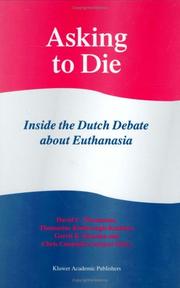| Listing 1 - 4 of 4 |
Sort by
|
Book
ISBN: 9035210107 Year: 1984 Publisher: Lochem De Tijdstroom
Abstract | Keywords | Export | Availability | Bookmark
 Loading...
Loading...Choose an application
- Reference Manager
- EndNote
- RefWorks (Direct export to RefWorks)
Colloques --- Colloquia --- Hôpitaux --- Ziekenhuiswezen --- Referral and Consultation --- Ambulatory Care Facilities --- Outpatient Clinics, Hospital --- organization & administration. --- organization & administration
Book
ISSN: 20330243 ISBN: 9782804193669 2804193667 Year: 2015 Volume: *18 Publisher: Louvain-la-Neuve : De Boeck Supérieur,
Abstract | Keywords | Export | Availability | Bookmark
 Loading...
Loading...Choose an application
- Reference Manager
- EndNote
- RefWorks (Direct export to RefWorks)
Quatrième de couverture : "Cet ouvrage propose d’accompagner les acteurs impliqués dans l’analyse, la construction ou la révision d’un curriculum dédié à la formation de professionnels de la santé, en formation initiale ou continue. Plus spécifiquement, il souhaite apporter une aide pour l’évaluation et l’élaboration d’un référentiel de compétences. Il s’adresse aux équipes enseignantes mais aussi à toutes les parties prenantes (stakeholders), tels que les gestionnaires, les concepteurs de programmes, les équipes de direction et les équipes cadres, ou encore les professionnels de terrain et les étudiants qui souhaitent s’impliquer dans les programmes et organisations concernés. Ce guide s’adosse au cadre général de l’approche par compétences intégrée (APCi), qui fournit des orientations pour une démarche méthodologique explicite d’élaboration, dans un contexte donné, d’un référentiel de compétences. En tant que cadre conceptuel et opérationnel des dispositifs curriculaires et pédagogiques dédiés à la formation de professionnels de la santé, ce dernier a une double finalité : d’une part, désigner de façon pertinente l’objet de l’enseignement et de l’apprentissage, d’autre part, structurer et articuler, de façon cohérente et ouverte, les activités d’enseignement, d’apprentissage et d’évaluation dans le cadre de dispositifs curriculaires. À travers un questionnement progressif, le lecteur est guidé pas à pas dans l'élaboration d'un référentiel de compétence intégré, qui est illustrée par de nombreux exemples, extraits des expériences de formation professionnelle que les auteurs ont accompagnées. L’ensemble confère à la démarche proposée une forte crédibilité conceptuelle et opérationnelle."
Vocational Education --- Professional --- Professional Competence --- Education, Medical --- Referral and consultation --- Référentiel (éducation) --- Programmes d'études --- Formation professionnelle --- Éducation fondée sur la compétence --- Education --- Competency-based education --- Occupational training --- Curricula --- Medical education --- Medical personnel --- Clinical competence --- Vocational qualifications --- Enseignement médical --- Personnel médical --- Compétence clinique --- Qualifications professionnelles --- Enseignement médical --- Personnel médical --- Compétence clinique --- Referral and Consultation. --- Programmes d'études. --- Formation professionnelle. --- Éducation fondée sur la compétence. --- Programmes d'études. --- Professional Competence - handbooks

ISBN: 0897667522 0897667514 Year: 1992 Volume: 670 Publisher: New York : New York Academy of Sciences,
Abstract | Keywords | Export | Availability | Bookmark
 Loading...
Loading...Choose an application
- Reference Manager
- EndNote
- RefWorks (Direct export to RefWorks)
Computer networks --- Hospitals --- Medical consultation --- Medical telematics --- Computer Communication Networks --- Hospital Information Systems --- Referral and Consultation --- Congresses. --- Communication systems --- congresses. --- Medical informatics --- Congresses --- Telematics --- Medical informatics - Congresses. --- Medical consultation - Congresses. --- Telematics - Congresses. --- Computer networks - Congresses. --- Hospitals - Communication systems - Congresses. --- Computer communication networks --- Hospital information systems --- Referral an consultation

ISBN: 0792351851 9780792351856 079235186X 9780792351863 9786610043262 1280043261 0306468638 Year: 1998 Publisher: Dordrecht Kluwer Academic Publishers
Abstract | Keywords | Export | Availability | Bookmark
 Loading...
Loading...Choose an application
- Reference Manager
- EndNote
- RefWorks (Direct export to RefWorks)
claim was that he had faced a conflict of duties pitting his legal duty not to kill against his duty as a physician to relieve his patient’s unbearable suffering. He was acquitted on the important grounds of conflict of duty. These grounds are based on a concept in Dutch law called "force majeure" 4 which recognizes extenuating circumstances such as conflicts of duty. The acquittal was upheld by the Lower Court of Alkmaar, but revoked by an Amsterdam court of appeal. The case went on to the Supreme Court, but before the Supreme Court's decision was issued, the Royal Dutch Medical Association (RDMA) attempted to clarify the criteria for euthanasia that many within the profession already accepted. The RDMA proposed that physicians be permitted to perform euthanasia provided that a set of procedures had been met. Variously stated, the guidelines contain the following central provisions: Voluntary, competent, explicit, and persistent requests on the part of the • patient; Requests based on full information; • The patient is in a situation of intolerable and hopeless suffering (either • physical or mental); No further acceptable alternatives to euthanasia. All alternatives • acceptable to the patient for relief of suffering having been tried; Consultation with at least one other physician whose judgment can be • 5 expected to be independent. Indirectly, these guidelines became the criteria prosecutors used to decide whether or not to bring charges.
Medical law --- Professional ethics. Deontology --- Netherlands --- Euthanasia --- Right to die --- Euthanasie --- Droit à la mort --- -#GBIB:CBMER --- 179.7 <492> --- 343.61 <492> --- Assisted death (Euthanasia) --- Assisted dying (Euthanasia) --- Death, Assisted (Euthanasia) --- Death, Mercy --- Dying, Assisted (Euthanasia) --- Killing, Mercy --- Mercy death --- Mercy killing --- Homicide --- Medical ethics --- Assisted suicide --- Ethics. --- Euthanasia - Netherlands. --- Medical ethics. --- Medicine. --- Suicide --- Health Care Quality, Access, and Evaluation --- Persons --- Philosophy --- Mandatory Programs --- Medicine --- Behavior and Behavior Mechanisms --- Health Personnel --- Behavioral Symptoms --- Crime --- Weights and Measures --- Terminal Care --- Religion --- Hospitals, Special --- Social Control Policies --- Ethics, Clinical --- Mental Processes --- Patient Care --- Behavioral Sciences --- Morals --- Humanities --- Social Problems --- Social Control, Formal --- Chemicals and Drugs --- Emotional Intelligence --- Psychophysiology --- Psychological Phenomena and Processes --- Health Facilities --- Policy Making --- Organizations --- Disclosure --- Social Sciences --- Withholding Treatment --- Criminology --- Community Health Services --- Social Control, Informal --- Patient Rights --- Education, Professional --- Science --- Professional Practice --- Health Care --- Sociology --- Health Services --- Organization and Administration --- Natural Science Disciplines --- Health Care Facilities, Manpower, and Services --- Policy --- Ethics, Professional --- Education --- Investigative Techniques --- Named Groups --- Occupational Groups --- Therapeutics --- Health Care Economics and Organizations --- Behavior --- Health Occupations --- Communication --- Self-Injurious Behavior --- Anthropology, Education, Sociology and Social Phenomena --- Human Rights --- Intelligence --- Psychiatry and Psychology --- Psychology, Social --- Behavioral Disciplines and Activities --- Health Services Administration --- Disciplines and Occupations --- Analytical, Diagnostic and Therapeutic Techniques and Equipment --- Personality --- Christianity --- Euthanasia, Active, Voluntary --- Intention --- Mental Competency --- Suicide, Assisted --- Wedge Argument --- Ethics --- Euthanasia, Active --- Euthanasia, Passive --- Mandatory Reporting --- Motivation --- Organizational Policy --- Public Policy --- Criminal Law --- Ethics, Medical --- Hospices --- Psychiatry --- Social Responsibility --- Advisory Committees --- Ethical Analysis --- Patients --- Physicians --- Stress, Psychological --- Informed Consent --- Palliative Care --- Education, Continuing --- Hospitals --- Empirical Research --- Legislation as Topic --- Internationality --- Pharmaceutical Preparations --- Societies --- Judicial Role --- Referral and Consultation --- Double Effect Principle --- International Cooperation --- Jurisprudence --- Research --- Public Opinion --- Reference Standards --- Biology --- Health & Biological Sciences --- Biology - General --- Medical Ethics & Philosophy --- Droit à la mort --- EPUB-LIV-FT SPRINGER-B --- Political science. --- Public health. --- Medicine & Public Health. --- Theory of Medicine/Bioethics. --- Public Health. --- Political Science. --- #GBIB:CBMER --- Administration --- Civil government --- Commonwealth, The --- Government --- Political theory --- Political thought --- Politics --- Science, Political --- Social sciences --- State, The --- Deontology --- Ethics, Primitive --- Ethology --- Moral philosophy --- Morality --- Philosophy, Moral --- Science, Moral --- Values --- Community health --- Health services --- Hygiene, Public --- Hygiene, Social --- Public health services --- Public hygiene --- Social hygiene --- Health --- Human services --- Biosecurity --- Health literacy --- Medicine, Preventive --- National health services --- Sanitation --- Biomedical ethics --- Clinical ethics --- Health care ethics --- Medical care --- Bioethics --- Professional ethics --- Nursing ethics --- Social medicine --- Moral and ethical aspects --- Euthanasia - Netherlands --- Euthanasie - Pays-Bas
| Listing 1 - 4 of 4 |
Sort by
|

 Search
Search Feedback
Feedback About UniCat
About UniCat  Help
Help News
News